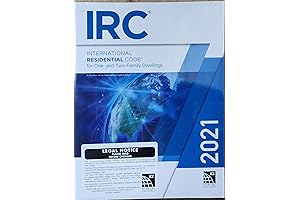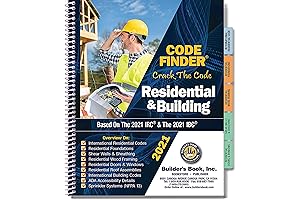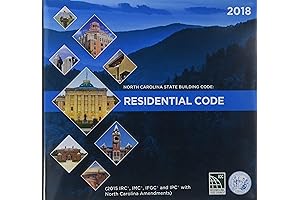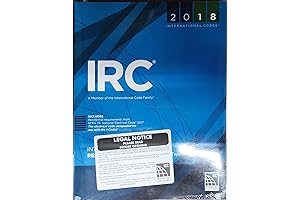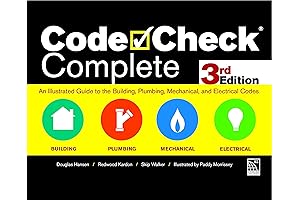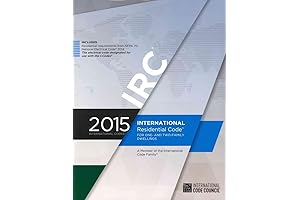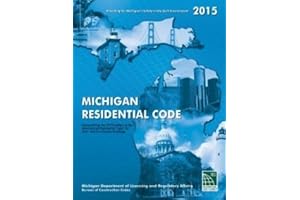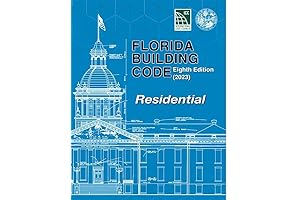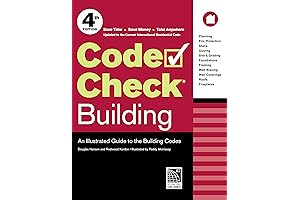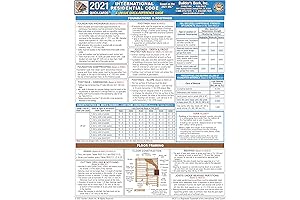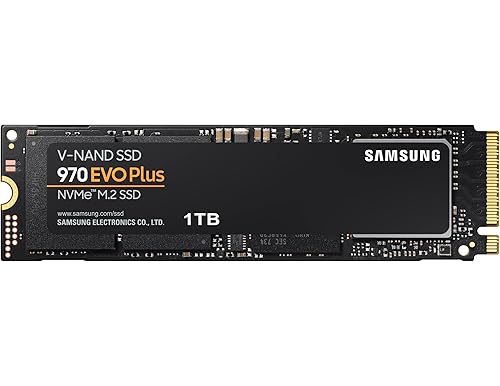· building codes · 12 min read
Best Residential Building Code Books: A Comprehensive Guide (2024)
Unravel the world of residential building codes with our top picks for the best books. From expert insights to practical guidance, these must-have resources will empower you to navigate building regulations effortlessly.
Building a home is a significant endeavor, and adhering to building codes is paramount. Embrace the latest knowledge with our comprehensive guide to the best residential building code books. Whether you're a contractor, architect, or homeowner embarking on a construction project, these invaluable resources will guide you through the complexities of building codes, ensuring compliance and safety.
Overview

PROS
- Adheres to the latest building code updates and safety regulations
- Serves as a comprehensive resource for contractors, architects, and homeowners alike
CONS
- Code interpretations can vary by locality
The 2021 International Residential Code (IRC) is an invaluable reference for anyone involved in residential construction or remodeling. This comprehensive codebook provides detailed standards and requirements for all aspects of residential buildings, including structural elements, electrical systems, plumbing systems, and more. By adhering to the IRC, builders and homeowners can ensure that their projects are safe, energy-efficient, and compliant with local building regulations.
The 2021 IRC has been updated to reflect the latest changes in building codes. These updates address emerging safety concerns and technological advancements, ensuring that the code remains current with the evolving needs of the building industry. Whether you're a professional contractor or a DIY homeowner, the 2021 IRC is an essential resource that will help you build a safer and more code-compliant home.

PROS
- Based on the 2021 IRC and 2021 IBC codes
- Complete residential and building code reference
CONS
- May not be valid for local jurisdictions
- Electronic version may not be easy to search
2021 IRC & IBC Code Finder is the latest residential and building code guide, presenting a complete reference to the latest codes released in 2021. With access to the complete text of both the International Residential Code (IRC) and the International Building Code (IBC), this manual serves as an indispensable tool for construction professionals, architects, homeowners, and other users.
This book includes a straightforward and accessible layout that allows you to easily search and navigate the building code requirements. It covers a wide range of topics encompassing residential construction, including structural design, plumbing, mechanical, and electrical systems. Whether you're designing a new home, remodeling your current space, or just seeking to ensure compliance with the most recent building codes, this code finder is an invaluable resource.

PROS
- Essential resource for anyone involved in residential construction in North Carolina
- Up-to-date with the latest building codes
CONS
- Can be quite technical and difficult to understand for some
- May not be suitable for all types of residential construction projects
The North Carolina State Building Code: Residential is an indispensable resource for anyone involved in residential construction in North Carolina. It contains the latest building codes and regulations, ensuring that your project meets all safety and quality standards.
The book is well-organized and easy to use, with clear and concise explanations of the code requirements. It also includes helpful diagrams and illustrations to help you understand the code provisions.

PROS
- Up-to-date guidance on the latest residential construction standards
- Clear and concise explanations of code requirements, ensuring adherence and safety
- Comprehensive coverage of all aspects of residential construction, from foundations to roofing
CONS
- May not be suitable for commercial or multi-family construction projects
- Can be overwhelming for homeowners or casual readers due to its technical nature
The 2018 International Residential Code (IRC) is an indispensable resource for anyone involved in residential construction. As a seasoned home builder, I've relied on this code book for years to ensure my projects meet the highest standards of safety and compliance. The IRC provides a comprehensive overview of all aspects of residential construction, including structural requirements, electrical systems, plumbing, and energy efficiency measures. Its clear and concise explanations make it easy to understand and implement the code, even for those new to the industry.
One of the key strengths of the IRC is its regular updates. The 2018 edition incorporates the latest advancements in building science and technology, ensuring that homes built in accordance with the code are not only safe but also energy-efficient and sustainable. For professional builders, architects, and contractors, the IRC is an essential tool that helps us deliver high-quality, code-compliant homes to our clients.

PROS
- Provides thorough explanations of complex code requirements with clear illustrations.
- Serves as an accessible resource for builders, inspectors, and homeowners alike.
- Keeps you up-to-date with the latest code modifications and amendments.
CONS
- Can be overwhelming for beginners due to its comprehensive nature.
- Digital format not included, limiting accessibility.
Code Check Complete 3rd Edition is the definitive guide to residential building code compliance. This comprehensive guidebook meticulously breaks down the often-daunting building, plumbing, mechanical, and electrical codes, making them easy to understand and apply.
With its clear and concise explanations, Code Check Complete empowers builders, inspectors, and homeowners with the knowledge they need to ensure construction projects adhere to the latest code requirements. The third edition includes crucial updates and amendments, keeping you at the forefront of building code regulations. Whether you're a seasoned professional or embarking on your first home renovation, Code Check Complete is an invaluable resource that will guide you through every step of the process.

PROS
- Comprehensive updates to existing residential codes ensure structural safety and energy efficiency.
- Clear and concise language makes compliance easier than ever before.
CONS
- Some users may find the sheer volume of information overwhelming.
The 2015 International Residential Code for One- and Two-Family Dwellings is an essential resource for anyone involved in residential construction. This updated codebook provides the latest requirements for building safe and energy-efficient homes, ensuring compliance with the most recent standards. Its user-friendly format and clear explanations make it an invaluable tool for builders, contractors, and homeowners alike.
One of the key strengths of this codebook is its comprehensiveness. It covers every aspect of residential construction, from foundation to roof. This comprehensive coverage ensures that you have all the information you need to build a home that meets all applicable codes. Another advantage of this codebook is its user-friendliness. The clear and concise language makes it easy to understand the requirements, even for those who are not familiar with building codes. The logical organization of the codebook also makes it easy to find the information you need quickly and efficiently.

PROS
- Provides a comprehensive and up-to-date overview of the 2015 Michigan Residential Code.
- Offers clear and concise explanations of code requirements, ensuring compliance and safety.
- Serves as a valuable reference for builders, contractors, inspectors, and homeowners.
CONS
- May require additional resources for highly specialized or complex projects.
- Updates may be needed to stay current with the latest code amendments.
The 2015 Michigan Residential Code Book is an indispensable guide for navigating the intricate landscape of building regulations. It empowers builders, contractors, and homeowners alike with a thorough understanding of the code's requirements, enhancing safety and ensuring compliance. This comprehensive resource provides clear and accessible explanations of code provisions, covering essential aspects such as structural design, energy efficiency, and fire safety. By adhering to the principles outlined in this book, builders can construct safe and livable homes, while homeowners can make informed decisions about their properties. Its user-friendly format and detailed illustrations make it an invaluable tool for anyone involved in residential construction or remodeling. Whether you're a seasoned professional or a first-time homeowner, this book provides the knowledge and guidance necessary to navigate the complexities of building codes and ensure the integrity and safety of your residential projects.
In addition to its practical applications, the 2015 Michigan Residential Code Book also serves as an educational resource. It demystifies complex technical concepts, making them accessible to laymen and professionals alike. By fostering a deeper understanding of building codes, this book promotes responsible construction practices and contributes to the safety and well-being of our communities. Its relevance extends beyond the construction industry, as it empowers homeowners with the knowledge to make informed decisions about their properties and safeguard their families.

PROS
- Provides the most up-to-date and comprehensive building code requirements for residential construction in Florida.
- Offers clear and concise guidance to ensure compliance with building codes and regulations.
CONS
- Can be overwhelming for those new to building code requirements.
- May require additional resources for thorough understanding.
Elevate your residential construction knowledge with the indispensable Florida Building Code - Residential, Eighth Edition. This comprehensive guidebook empowers you with the latest building code requirements, ensuring the safety, durability, and functionality of your residential projects. Its user-friendly format simplifies complex regulations, providing a clear roadmap for successful construction.
Stay compliant and avoid costly delays with the Florida Building Code - Residential, Eighth Edition. Whether you're an experienced contractor, architect, or DIY enthusiast, this essential reference tool will guide you every step of the way. By adhering to the code's stringent standards, you can confidently deliver high-quality, code-compliant residential structures that meet the highest industry benchmarks.

PROS
- Comprehensive coverage of the latest residential building code requirements
- Clear and concise explanations make the code accessible to builders and homeowners alike
CONS
- Some readers may find the level of detail overwhelming
Code Check Building: An Illustrated Guide to the Residential Building Code is an invaluable resource for anyone involved in residential construction. This book provides a comprehensive overview of the latest building codes, making it an essential tool for builders, architects, and homeowners alike.
The book is well-organized and easy to navigate. It covers all aspects of residential construction, from foundations to roofing. The illustrations are clear and helpful, and the text is written in a straightforward and easy-to-understand style. Code Check Building is the perfect resource for anyone who wants to stay up-to-date on the latest building codes.

PROS
- Provides quick and easy access to crucial residential building code information.
- Features essential code requirements, arranged in a clear and concise format.
CONS
- May not be as comprehensive as a full-fledged code book.
- Could benefit from more detailed explanations and examples.
The 2021 International Residential Code (IRC) Quick-Card is an invaluable resource for residential building code professionals. This handy guide offers a comprehensive overview of the latest IRC requirements, presented in a concise and easy-to-navigate format. Whether you're a seasoned contractor or a homeowner looking to understand the regulations, the Quick-Card has you covered.
One of the key strengths of this Quick-Card is its portability. It's designed to fit easily into your pocket or toolbox, making it the perfect companion for on-site inspections or quick reference during construction. The code requirements are organized logically, with color-coded tabs for different sections, ensuring that you can find the information you need quickly and efficiently.
Residential building codes serve as the foundation for safe and habitable structures. Our curated list of the best books on this topic empowers you with the knowledge and expertise to navigate building regulations, ensuring your project's compliance and success. These comprehensive books offer in-depth insights, practical guidance, and expert advice, catering to contractors, architects, and homeowners alike.
Frequently Asked Questions
What is the most current International Residential Code (IRC)?
The 2021 International Residential Code (IRC) is the latest edition of the widely adopted building code for residential construction in the United States.
Which book provides an overview of both the IRC and IBC codes?
Residential & Building Code Finder Based on the 2021 IRC and 2021 IBC offers a comprehensive examination of both the International Residential Code and the International Building Code, providing a valuable resource for professionals.
Is there a specific book for the Michigan Residential Code?
Yes, the 2015 Michigan Residential Code provides specific guidance and requirements for residential construction within the state of Michigan.
Which book is designed as an illustrated guide to building codes?
Code Check Building: An Illustrated Guide to the Building Codes presents building codes in an accessible and visually appealing format, making it easier to understand and apply regulations.
Is there a quick reference guide available for the IRC?
The 2021 International Residential Code (IRC) Quick-Card offers a concise and portable reference to the key provisions of the IRC, providing essential information at your fingertips.
